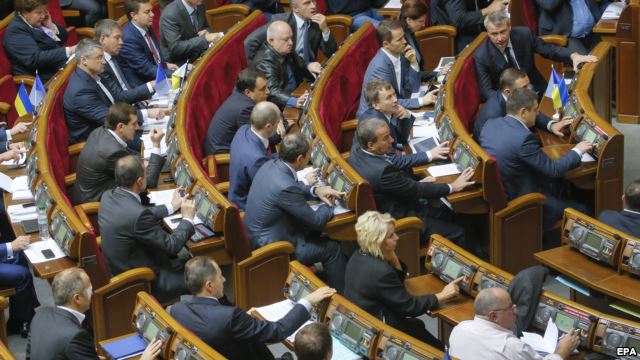Kyiv – Member of the Parliament may try to exclude key positions from the anti-corruption laws approved on Tuesday in their first reading during the preparation of the second reading, some civil activists assume. The final approval of the number of laws aimed to fight corruption is expected on October 14. Out of the entire anti-corruption package in general, only one law has been passed so far.
At the fourth attempt, after threats on part of the Speaker of the Parliament Oleksandr Turchynov to publish the names of those who are not voting, the member of the Parliament approved the bill to amend the Criminal and Criminal Procedure Codes regarding the irreversible nature of punishment for certain crimes against the basis of national security, civil security, and corruption crimes. This way the Verkhovna Rada allowed the in absentia condemnation and property confiscation of those who are wanted internationally for crimes against Ukraine.
This law allows to punish Viktor Yanukovych and his associates, and confiscate the property of those who support terrorism, notes chairman of the board of civil organization Center for Corruption Counteraction Vitaly Shabunin.
“It is an interim victory. As such, only one key anti-corruption amendments was approved in whole. The creation of the Anti-Corruption Bureau, the illegal enrichment, the opening of the immovable property registry, the creation of beneficiary owners of legal persons registry were approved in the first reading. They will be examined in their second reading on Tuesday. What is important here? That all votes are present on Tuesday. Second, for the key norms not to vanish from the bills during preparation for Tuesday,” noted Shabunin.
Members of the Party of Regions faction also voted for the presidential and governmental anti-corruption bills. To see what is next, says one of them, Nestor Shufrych.
“There is a position of some law experts regarding the imperfection and incapacitation of these laws. However, as of today, we support this law and want to see how fight against corruption will happen. We will not interfere and we will help in this process. However, it is interesting why this is being done now, three weeks before the elections, and not on the first day of coming to power?” Shufrych asks.
Yatseniuk: they don’t give money to corrupt countries
According to another law passed in its first reading, on the creation of the Anti-Corruption Bureau, the new institution has to engage in investigating corruption crimes committed by high officials: Ministers, member of the Parliament, 1-2 rank state officials, judges, workers of the Office of the Prosecutor General, high-ranking officers, heads of state-owned companies.
The approval of this bill before the end of October is one of the key demands the IMF made for the following tranche to Ukraine, reminded Prime Minister Arseniy Yatseniuk when speaking in the Parliament.
“It is one of the key elements of the plan for Ukraine’s economic restoration. Nobody gives money to corrupt countries, and investors don’t come to corrupt countries either,” Yatseniuk emphasizes.
An alternative bill penned by Batkivshchyna member Serhiy Pashynsky was not up for examination, but important points from it will be used in preparation of the law for the second reading. Pashynsky emphasizes the main drawbacks of the presidential bill.
“The President’s bill prescribes full control and governance by an independent anti-corruption body on part of the Office of the Prosecutor General. The second issue: the corrupt act is not defined in the legislative plain. Third, the President’s law, for example, does not list the articles subject to anti-corruption investigation,” Pashynsky claims.
Chumak: the President has no veto power
Meanwhile, UDAR member Viktor Chumak assures that one of the main advantages of the law is the algorithm of appointing the head of the Anti-Corruption Bureau, who would ensure the independence of this body.
“The competition committee includes three representatives of the president, three representatives of the Cabinet of Ministers and three representatives of the Verkhovna Rada. The procedure of appointment is open. Every session of the nomination committee happens on camera. This nomination committee selectors three candidates, and interviews them on air. After this interview, they select one of the three candidates live and sends the approval to the President. The President has no veto power,” Chumak explains.
The Verkhovna Rada passed another three governmental anti-corruption initiatives in the first reading. One of them prescribes the creation of a National Committee for Corruption Prevention which, amongst other things, would monitor declarations signed by state workers and the officials’ lifestyles. Another bill regarding the final beneficiaries of legal persons and public activists presumes that real owners of business will be unable to hide behind offshore schemes any longer. The last anti-corruption decision talks about prevention and counteraction of laundering revenues received illegally and financing of terrorism.


